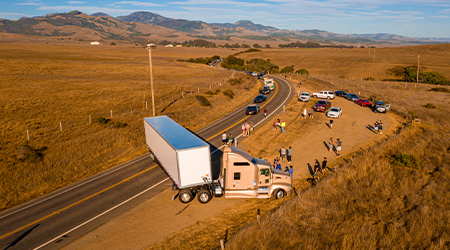
Due to the sheer size and mass of commercial trucks compared to passenger vehicles, it’s no surprise that truck accidents can cause serious or fatal injuries. In a jackknife accident, a truck’s tractor and trailer skid out of control across the highway. Any vehicles and people in the path of the skidding truck are at serious risk of injury.
If you have been injured because a truck driver lost control and caused a jackknife truck accident, you may be entitled to seek compensation for your medical expenses and other associated costs and losses. However, that compensation can vary widely based on several factors, including hiring the wrong attorney or forgoing an attorney altogether. The truck accident lawyers of Joye Law Firm have investigated truck crashes and recovered money for accident victims in South Carolina for decades. We know what you are up against. Trucking companies and their insurance companies have some of the most sophisticated accident response teams, and they have one goal: pay out as little as possible to accident victims. While emergency crews are still on scene, they’ve likely already sprung into action trying to limit their liability, and they will continue to fight through the entire process. Because of our years of hands-on experience, our attorneys understand the types of evidence needed to hold truck drivers and trucking companies accountable after a jackknife accident.
We stand ready to fight for you. Contact Joye Law Firm now at (888) 324-3100 or online to schedule your free initial consultation with a knowledgeable member of our legal team.
What Is Jackknifing?
The term “jackknife” refers to a truck accident in which the two separate parts of a big rig (the cab and the trailer) fold in toward each other at the trailer hitch. The two parts of the vehicle closing upon each other resemble a closing pocketknife. These types of wrecks tend to create extremely gruesome-looking accidents scenes.
A jackknife accident typically occurs when some part of the truck loses traction. Because the cab and trailer are hitched, the tractor and trailer begin to slide toward each other. If the tires on the tractor skid first, the momentum of the trailer spins the cab into a fold. If the trailer tires lose traction, the trailer will swing around into the cab.
When a large truck is jackknifing, a 50-foot trailer and a 30-foot cab are sliding out of control. Worse yet, the entire rig may roll over because trucks have a high center of gravity compared to automobiles. Vehicles in adjacent lanes of traffic can be struck by a tractor-trailer in a jackknife accident. If the truck overturns, a cargo spill can cause additional traffic hazards.
What Causes a Semi Truck Jackknife Accident
If one portion of a tractor-trailer suddenly decreases speed, such as by losing traction with the road for a moment, other portions of the truck continue to move and spin either clockwise or counterclockwise around the truck’s center of gravity. This spinning motion is known as yaw. While a car might fishtail, a strong and sudden yaw can pull a joined vehicle off balance and send the tractor and/or trailer spinning toward the other like a closing jackknife, hence the name.
Jackknifing is usually caused by some kind of driving error:
- A truck driver who is traveling too fast and has to make a sudden steering or braking maneuver can trigger a jackknifing. This is the same as any vehicle being thrown into a skid, except that the shifting weight of a joined tractor and trailer can cause the rig to jackknife. A trucker who is running too fast in inclement weather, such as heavy rain, risks the kind of loss of traction, skidding or hydroplaning that can lead to a jackknife.
- Improper braking. Braking too hard and locking up the tractor’s drive axles will cause the trailer to push forward into a jackknife. Truckers who tailgate or are distracted while driving can find themselves locking up their brakes to try to avoid a collision if vehicles in front stop suddenly.
- Too fast while turning. As a tractor-trailer goes through a turn or rounds a curve, the skill of being a truck driver is knowing how to keep the trailer running in sync with the cab and under control. Remember, the trailer on its own wants to keep moving in a straight line. If pulled too abruptly, the back end of the trailer can swing out of line and start skidding inward toward the cab. This can happen when a truck driver is going too fast and makes a sudden turn or oversteers to correct a mistake in a curve, on an exit or entrance ramp, or around a turn.
Two other common causes of jackknife accidents are improperly loaded trucks and mechanical failures. A truck driver is responsible for conducting daily inspections to identify safety issues, and trucking companies are responsible for addressing any safety issues to prevent accidents. However, sometimes these issues are ignored or are knowingly left unaddressed:
- Improperly loaded and shifting cargo. Transfer trucks carry thousands of pounds of cargo. If cargo moves suddenly while en route, it can change a semi truck’s center of gravity enough to make it jackknife. Cargo must be correctly loaded and properly secured. Drivers of tanker trucks must be cautious of partially filled tanks, which are susceptible to the shifting weight of liquid cargo sloshing back and forth. A sudden shift in liquid cargo in a tanker can cause the truck to overturn.
- Mechanical or tire failure. Faulty brakes, a blown tire, failed coupling or other malfunctions among a tractor trailer’s many components can cause enough loss or increase in traction and speed to send the truck into a jackknifing skid. Such failures are often due to inadequate maintenance but could be caused by defective products.




